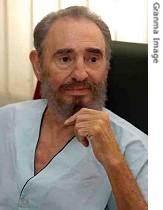2007年VOA标准英语-Former Communist Nations' Political Transitions
时间:2019-02-02 作者:英语课 分类:2007年VOA标准英语(二月)
Washington, DC
01 February 2007
watch Cuba Transition Lessons
As questions continue over Cuban leader Fidel Castro's health, there is a widespread speculation 1 that his communist regime will not survive without him. Many wonder whether Cuba will shed the oppressive regime and move toward a free society? If so, what challenges will it likely face? Ambassadors from four formerly 2 communist East European states discussed their own countries' experiences as they transition from a one-party dictatorship to a pluralistic society. For producer Ivana Kuhar, VOA's Jim Bertel has more.

Image of Fidel Castro posted on Granma web site Tuesday, Sept. 5, 2006
Fidel Castro has not been seen in public since July when he underwent surgery and temporarily handed power to his younger brother, Defense 3 Minister Raul Castro. With many concerned about his health, some analysts 4 say they do not expect the Cuban communist regime to survive without its 80-year-old founder 5.
East and Central European countries faced a similar crossroads when their own communist regimes ended in 1991. Now, 16 years later, the transition for many has been a great success:
“We have successfully turned away from a command economy to a flourishing market economy,” says Andras Simonyi, Hungarian Ambassador to the U.S. “Our societies are free. We have the freedom of speech. We have a free press. We have a rule of law and everybody is equal in front of our law. We have a multiparty political system, with checks and balances.”
Mr. Simonyi, and the ambassadors of Slovakia, Poland and the Czech Republic, participated in a roundtable discussion at the Voice of America.
Sixteen years after the demise 6 of communism, these four nations are among the wealthiest post-Communist countries in Europe. The four are members of the European Union.
Slovak Ambassador Rastislav Kacer says his country's political transformation 7 has not always been easy. He says it took courage to push through painful reforms. "The transformation from the centrally commanded economy to a free economy is sometimes painful. You have to restructure the economy and you necessarily have a stage when your economy is going slightly down, because you have to cut the production, which is not bringing (in) money, which was subsidized by the government. and was eating money from something else."
Privatization of state-owned business often requires foreign investments. Outside investment can lead to concerns that a country's assets are being cheaply sold to foreigners. Another common fear is that privatization brings about the disappearance 8 of a comfortable social net, including universal health care and unemployment benefits.
"Not so", says the Slovak Ambassador, pointing to the profitable sale of the Slovak auto 9 manufacturer Skoda to German giant Volkswagen.
"Today, it's a state-of-the-art company which is employing 10 to 20 times more people than what it used to employ in the old days. It is all Slovaks that work there. We're even coming to the limits, there are not enough Slovaks, we employ people coming from Ukraine or from Bulgaria. The average wage in the factory is, maybe, three times more than what it was before."
Peter Kolar, the Czech Republic's Ambassador to the U.S., says his countrymen are enjoying their newly acquired freedoms. "Now it is very much up to every single person to have responsibility for their own lives in their own hands. There is no central power now telling people what they have to do and how they should do that."
Simonyi says Hungarians are now true creators of their society. "If our people are not satisfied with what they see, every four years there are free elections. They vote and send a clear message how satisfied or how dissatisfied they are. That is a big deal."
The four ambassadors acknowledged that conditions in Cuba differ from that in the countries of the former Soviet 10 bloc 11. But they added that with Castro's demise, Cuba is poised 12 for fundamental political and economic reforms. They say Cubans can draw significant lessons from the experience of Eastern Europe's transition from communism t o democracy.
- Her mind is occupied with speculation.她的头脑忙于思考。
- There is widespread speculation that he is going to resign.人们普遍推测他要辞职。
- We now enjoy these comforts of which formerly we had only heard.我们现在享受到了过去只是听说过的那些舒适条件。
- This boat was formerly used on the rivers of China.这船从前航行在中国内河里。
- The accused has the right to defense.被告人有权获得辩护。
- The war has impacted the area with military and defense workers.战争使那个地区挤满了军队和防御工程人员。
- City analysts forecast huge profits this year. 伦敦金融分析家预测今年的利润非常丰厚。
- I was impressed by the high calibre of the researchers and analysts. 研究人员和分析人员的高素质给我留下了深刻印象。
- He was extolled as the founder of their Florentine school.他被称颂为佛罗伦萨画派的鼻祖。
- According to the old tradition,Romulus was the founder of Rome.按照古老的传说,罗穆卢斯是古罗马的建国者。
- He praised the union's aims but predicted its early demise.他赞扬协会的目标,但预期这一协会很快会消亡。
- The war brought about the industry's sudden demise.战争道致这个行业就这么突然垮了。
- Going to college brought about a dramatic transformation in her outlook.上大学使她的观念发生了巨大的变化。
- He was struggling to make the transformation from single man to responsible husband.他正在努力使自己由单身汉变为可靠的丈夫。
- He was hard put to it to explain her disappearance.他难以说明她为什么不见了。
- Her disappearance gave rise to the wildest rumours.她失踪一事引起了各种流言蜚语。
- Don't park your auto here.别把你的汽车停在这儿。
- The auto industry has brought many people to Detroit.汽车工业把许多人吸引到了底特律。
- Zhukov was a marshal of the former Soviet Union.朱可夫是前苏联的一位元帅。
- Germany began to attack the Soviet Union in 1941.德国在1941年开始进攻苏联。
- A solid bloc of union members support the decision.工会会员团结起来支持该决定。
- There have been growing tensions within the trading bloc.贸易同盟国的关系越来越紧张。